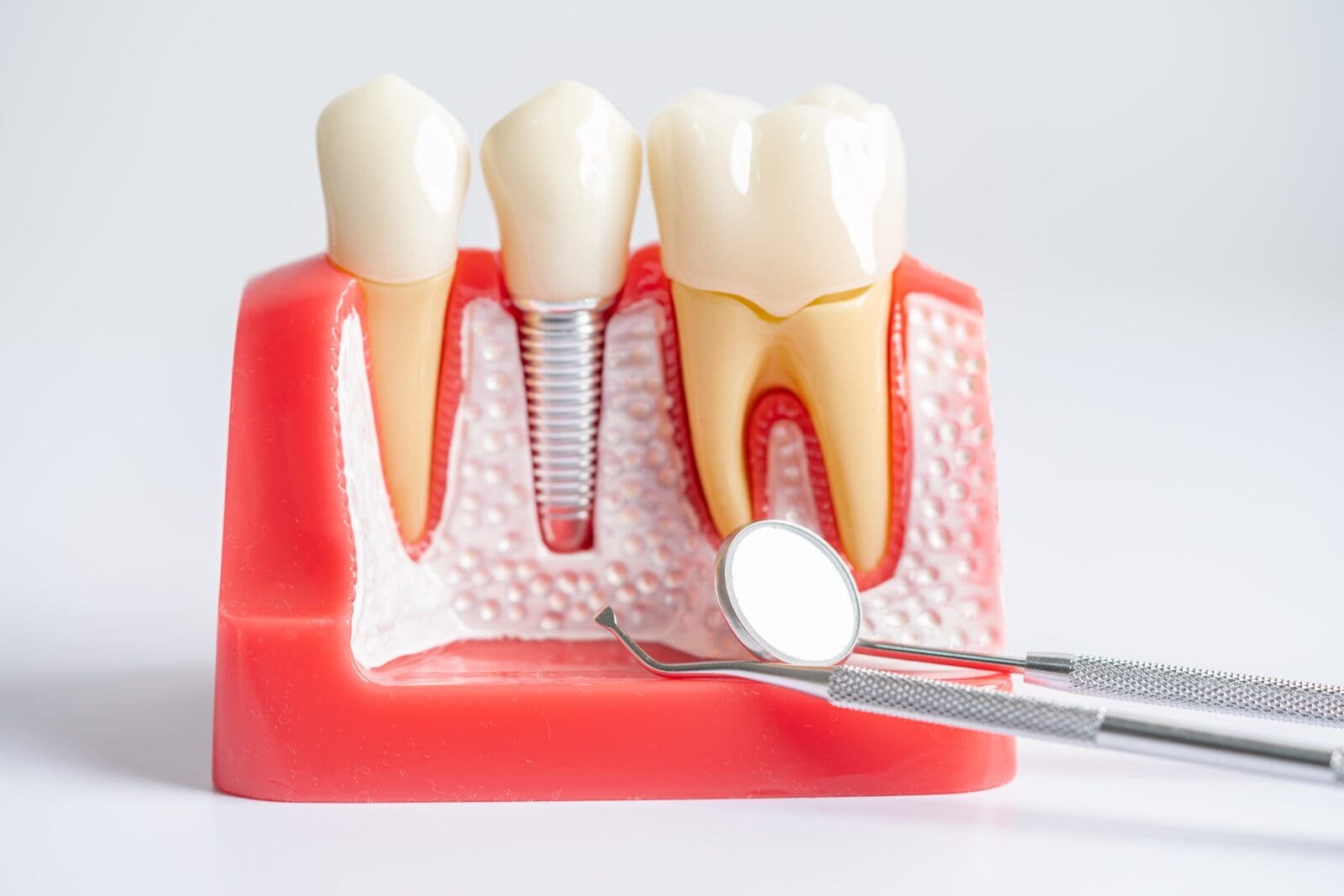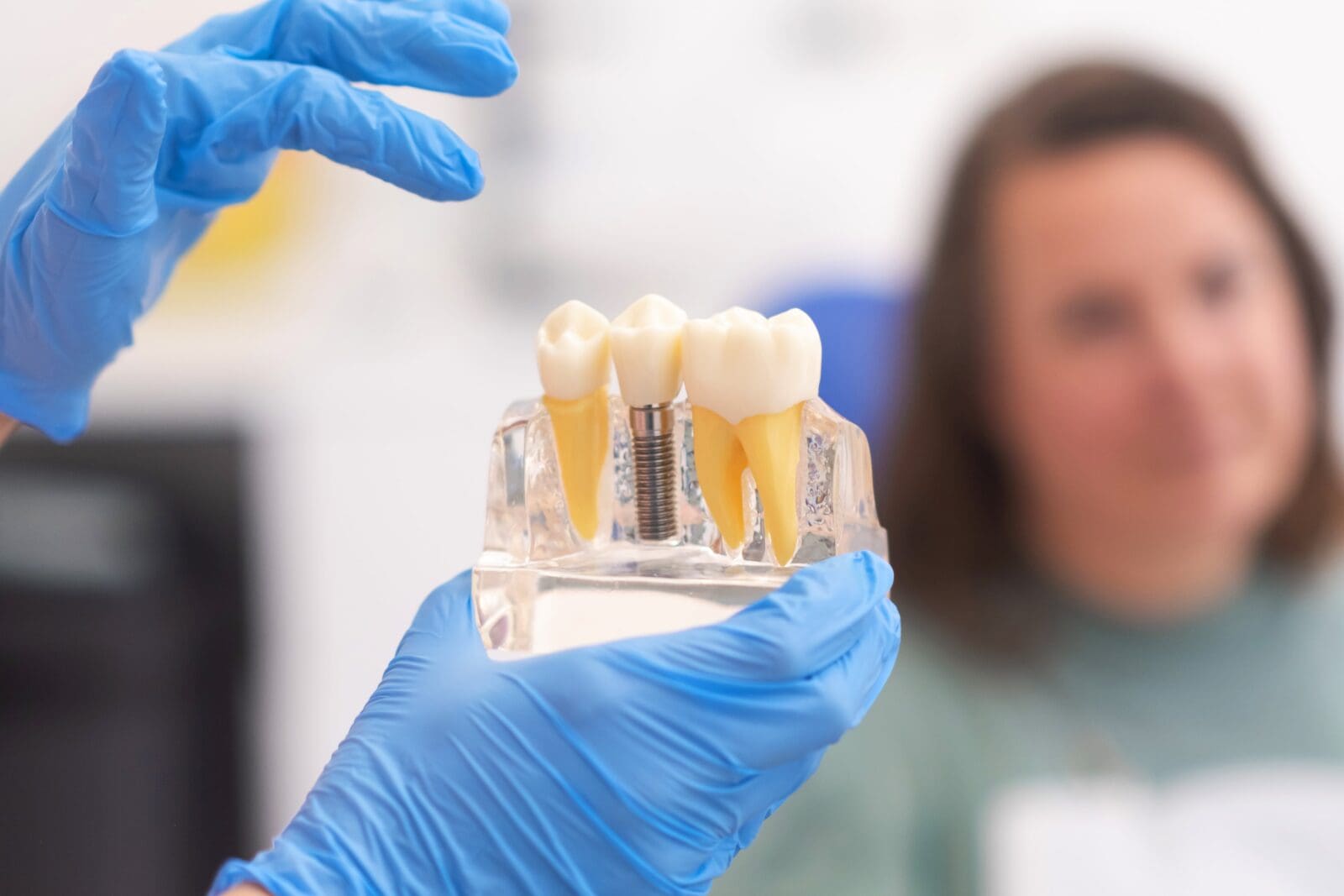A dental implant is a small post placed in your jaw to replace the root of a missing tooth.
It creates a sturdy base for a crown, bridge, or full-arch restoration, providing a tooth that functions, looks, and feels just like a natural one.
Unlike dentures, implants don’t move or slip. You can eat, speak, and smile with full confidence. They’re often made from titanium, a biocompatible metal that bonds with your bone over time.
In short: dental implants are the closest thing to getting your real teeth back.
Dental Implants Quick Highlights:
|
How Do Dental Implants Work?

Dental implants work by bonding with your jawbone, creating a strong, permanent foundation for new teeth. This process is called osseointegration, a natural fusion between the implant and bone.
Once healed, the implant acts just like a natural tooth root. From there, it supports different types of restorations depending on your needs:
- A crown for a single missing tooth
- A bridge for several missing teeth
- Implant-supported dentures for added security and comfort
- Or a full-arch solution like All-on-X implants to replace all teeth in a single arch
For patients with severe bone loss, advanced options like zygomatic dental implants may be recommended, offering support even when traditional implants aren’t possible.
The result? A stable, natural-feeling smile that restores confidence and function.
Who Should Consider Dental Implants?
If you’re missing teeth (or tired of dentures that don’t stay put), dental implants could be your answer. They’re designed for adults who want a lasting solution that feels like their natural smile.
You may be a good candidate if you:
- Have one or more missing teeth
- Struggle with loose, uncomfortable dentures
- Have bone loss from gum disease, injury, or long-term tooth loss
- Want a fixed, long-term solution without worrying about slipping or adhesives
Even if you’ve been told in the past that implants weren’t an option, that may have changed. Dr. Melanie Towe uses advanced techniques, including bone grafting and zygomatic implants, to help more patients qualify, even in complex cases.
Am I a Candidate for Dental Implants?
Not sure if our dental implants are right for you? A consultation will give you the answers. It’s a full assessment of your oral and overall health to ensure long-term success.
Jawbone Strength and Gum Health
Healthy bone and gums are key for implant stability. During your visit, we’ll check if your jaw has enough volume to support an implant. If not, bone grafting or other regenerative techniques may be recommended.
3D Imaging for Precision Placement
We use advanced 3D imaging to map your mouth in detail. This helps us plan exactly where implants should go, improving comfort, success, and aesthetics.
Review of Your Medical History
Your healing ability matters. We’ll review any chronic conditions like diabetes, medications, or smoking history to ensure your body can properly heal after implant surgery.
Solutions for Bone Loss and Gum Disease
Even if you have bone loss or past gum disease, it’s not necessarily a barrier. Many patients still qualify after proper treatment. Learn more in our Dental Implant FAQs.
How Long Do Dental Implants Last?

Dental implants are built to last, often 20 years or more. In many cases, they can last a lifetime. But like any investment in your health, their longevity depends on how well you care for them.
The titanium post placed in your jaw is exceptionally durable and resistant to wear. It won’t decay like a natural tooth. However, the health of the surrounding bone and gum tissue plays a crucial role in maintaining the implant’s long-term security.
Here’s what helps dental implants last:
- Daily oral hygiene practices, like brushing, flossing, and using a water flosser, can help prevent infections around the implant.
- Regular checkups. We recommend cleanings every 3–6 months to keep the area healthy and detect any issues early.
- Gum health maintenance. Inflammation around an implant (called peri-implantitis) is one of the top reasons for implant failure. Preventive care is key.
We also support long-term success through advanced gum disease treatment. If you’ve had a history of periodontal issues, we’ll create a personalized care plan to protect your results for the long haul.
How Much Do Dental Implants Cost?
You probably wonder, “How much do dental implants cost?”
The truth is that it varies based on the type of implant, the number of teeth being replaced, and whether additional procedures (such as bone grafting) are needed.
At our Frederick, MD practice:
- A single dental implant starts at a competitive rate based on clinical needs
- Full-arch solutions like All-on-X average around $25,000
While implants are an investment, they often last decades, making them more cost-effective than bridges or dentures over time. We also offer recommendations on financing options to make care accessible.
Frequently Asked Questions
What is a dental implant & how does it work?
A dental implant is a small metal post (usually titanium) surgically placed in the jawbone to act as a replacement tooth root. The implant gradually bonds with the bone through a process known as osseointegration. Once healed, it supports a crown, bridge, or full-arch prosthesis, providing a stable, natural-looking result.
How painful is getting a dental implant?
Getting a dental implant is typically less painful than most people expect. The procedure is done under local anesthesia so that you won’t feel discomfort during placement. Mild soreness afterward is common and usually managed with over-the-counter pain relievers. Many patients say recovery is easier than a tooth extraction.
What is the downside to dental implants?
The main drawbacks are the need for surgery and healing time. Implants also require sufficient bone and good overall health. They may not be covered entirely by dental insurance. In rare cases, complications like infection or implant failure can occur, especially without proper hygiene or follow-up care.
How long do dental implants last?
Dental implants are among the most durable and long-lasting dental solutions. With good oral hygiene and routine dental visits, they can last 20 years or more, often a lifetime. The crown or bridge on top may need replacement after 10–15 years due to wear and tear.
Do dental implants feel natural?
Yes. Once healed, implants look, feel, and function like your natural teeth. There’s no shifting, clicking, or discomfort like with removable dentures. You can eat, speak, and smile confidently.
Do dental implants get cavities?
No, the implant itself is made of metal and can’t get cavities. However, the surrounding gum tissue and bone must stay healthy. Without proper care, infections like peri-implantitis can threaten the stability of the implant, so brushing, flossing, and regular cleanings are essential.
Key Takeaways
- Dental implants are the most advanced, long-term solution for missing teeth.
- They fuse with the jawbone, offering unmatched stability and natural function.
- Implants can replace one tooth, several, or an entire arch.
- Most adults qualify, even those with bone loss or a gum disease history.
- With good care, implants can last decades, often a lifetime.
- Patients regain confidence, comfort, and a lasting smile.
Take the First Step Toward a Healthier, Stronger Smile in Frederick, MD
If you’re missing teeth or frustrated with dentures, dental implants could be your answer.
Are you in Frederick, MD, or the surrounding areas? Schedule a consultation with one of our experts to find out if you’re a candidate and explore your best options.
Don’t wait to love your smile again.
Contact us today to get started.
